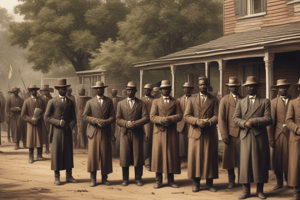Podcast
Questions and Answers
When did Reconstruction begin?
When did Reconstruction begin?
Before the war ended
Black codes, including vagrancy laws had which of the following effects? (Select all that apply)
Black codes, including vagrancy laws had which of the following effects? (Select all that apply)
- Continued racial discrimination
- Restricted freedoms of Black individuals
- Reestablished control over Black labor
- All of the above (correct)
How did the Fourteenth Amendment change American governance?
How did the Fourteenth Amendment change American governance?
Asserted the federal government's power to enforce the Bill of Rights over the authority of the states
In addition to election reform, what major accomplishment did black delegates achieve during the revision of southern state constitutions?
In addition to election reform, what major accomplishment did black delegates achieve during the revision of southern state constitutions?
What was General William T. Sherman's Special Field Order No. 15 intended to do?
What was General William T. Sherman's Special Field Order No. 15 intended to do?
Which of the following goals of freedpeople was the least successful?
Which of the following goals of freedpeople was the least successful?
How did black churches help to develop political organization in black communities? (Select all that apply)
How did black churches help to develop political organization in black communities? (Select all that apply)
Why did women's rights leaders oppose the Fourteenth Amendment?
Why did women's rights leaders oppose the Fourteenth Amendment?
What was the term for the African American ladies memorial association that arranged mourning for Union soldiers buried in Charleston?
What was the term for the African American ladies memorial association that arranged mourning for Union soldiers buried in Charleston?
What terrorist tactics did white southerners use to enforce racial hierarchies? (Select all that apply)
What terrorist tactics did white southerners use to enforce racial hierarchies? (Select all that apply)
Why did the Ku Klux Klan attack Allen Huggins?
Why did the Ku Klux Klan attack Allen Huggins?
What was the most common labor pattern in postbellum cotton agriculture?
What was the most common labor pattern in postbellum cotton agriculture?
What was the most significant change in the American economy as a result of the Civil War?
What was the most significant change in the American economy as a result of the Civil War?
What company declared bankruptcy, leading to the Depression of 1875?
What company declared bankruptcy, leading to the Depression of 1875?
The Compromise of 1877 did which of the following? (Select all that apply)
The Compromise of 1877 did which of the following? (Select all that apply)
Flashcards are hidden until you start studying
Study Notes
Reconstruction Era
- Reconstruction began before the Civil War ended, indicating early efforts to rebuild the nation.
- The Fourteenth Amendment empowered the federal government to enforce the Bill of Rights, enhancing federal authority over states.
Black Codes and Effects
- Black codes, including vagrancy laws, reinforced racial hierarchies and restricted freedoms, having widespread negative impacts on African Americans.
- Freedpeople faced challenges in gaining land access, marking this goal as the least successful for their community.
Contributions of Black Delegates
- Black delegates revised southern state constitutions and established public school systems, reflecting significant educational reform achievements.
General Sherman's Orders
- General William T. Sherman’s Special Field Order No. 15 aimed to allocate land in Georgia and South Carolina as homesteads for freed individuals, seeking to provide land ownership opportunities.
Role of Black Churches
- Black churches played crucial roles in organizing political efforts within black communities, contributing to collective advocacy and empowerment.
Women's Rights Movement
- Women's rights leaders opposed the Fourteenth Amendment due to its introduction of the term "male" into the Constitution, which represented a setback for gender equality.
Memorial Associations
- The African American Ladies Memorial Association, known as the Patriotic Association, arranged memorials for Union soldiers in Charleston, showcasing community solidarity and remembrance.
White Terror Tactics
- White southerners employed various terrorist tactics, such as violence and intimidation, to maintain racial hierarchies and suppress African American rights.
Ku Klux Klan Actions
- The Ku Klux Klan targeted individuals like Allen Huggins, a sheriff supporting civil rights for freed people, exemplifying their retaliatory violence against allies of African American communities.
Labor Patterns
- Sharecropping emerged as the most common labor pattern in post-Civil War cotton agriculture, reflecting an economic system that kept many African Americans in poverty.
Economic Shifts Post-Civil War
- The Civil War significantly increased the federal government’s presence in the economy, altering the landscape of American governance and economic practices.
Economic Depression of 1875
- The Depression of 1875 was triggered by the bankruptcy of Jay Cooke and Company, highlighting vulnerabilities within the post-war economy.
Compromise of 1877
- The Compromise of 1877 resulted in the promise to remove federal troops from the South, marking a significant shift in Reconstruction policies and the federal government’s role in southern affairs.
Studying That Suits You
Use AI to generate personalized quizzes and flashcards to suit your learning preferences.




